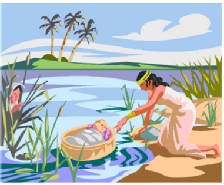10. Exodus Chapter 1 and Chapter 2 to verse 10.
Exodus, as we shall see, is probably the most important Book in the Jewish
Bible. The book begins with the Israelites in deep trouble in Egypt, where
they had settled. Joseph, his brothers, and that entire generation, had died out
and the Israelites had lived in Egypt for 370 years. Here we must look at the
political changes that had taken place in the country of the Nile. The Hyskos,
the shepherd Pharaohs, have lost power and a new dynasty reigns with power
residing in Thebes and Memphis.
In Chapter 1 v 8 we read of a new king ascending to throne of Egypt, one
who knew nothing of Joseph. This new king is thought to be Sethos I.. He
was very wary of the Israelites, who were rapidly increasing in numbers, so
he determined to break their spirit. To do this he organized them into slave
gangs to assist with the large building programme that was going on at that
time. Verse 14 of Chapter 1 tells us that 'he made life bitter for them with
cruel servitude', setting them to work on clay and brick-making, and all sorts
of work in the fields. Two cities are named as being built: Pithom and
Rameses (named after a Pharaoh).
The Pharaoh was so concerned with the high birth-rate among the Israelites
that he instructed their two mid-wives to kill all Israelite boys at birth. This
they refused to do explaining to Pharaoh, when asked why his orders were
not being carried out, that Israelite women gave birth very quickly before the
mid-wives could attend them.
Pharaoh then ordered every Hebrew (Israelite) boy to be thrown into the
river. The girls were allowed to live. I would like you to read Chapter 2 with
great care (I know, I sound like the schoolmaster that I am) where we meet
one of the great figures in the Bible, Moses who is destined to play a vital
part in the development of God's chosen people. What a wonderful story is
made of the birth of Moses. All the romantic elements are there. The mighty
River Nile; a baby cast on its waters in a waterproof basket; the sister
watching to see what would happen; the mother
on call to act as a wet nurse. Of course, it wasn't
as simple as that. Pharaoh’s daughter’s habits
must have been well known, so it was no
accident of fate that the baby was discovered. It
was all part of a deeply laid plot.
Next month we see Moses as a young man murdering a fellow Hebrew and fleeing
Egypt before he is called by God to undertake 14 a tremendous task
